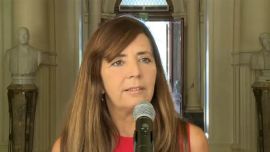New restrictions introduced to protect Central Bank reserves are only “temporary” and should not spark fears among citizens, Argentina's Presidential Spokesperson Gabriela Cerruti said Friday.
Speaking at a press conference, Cerruti accused the opposition of “fear-mongering” and said new rules for consumers and banks – including a measure prohibiting the credit card financing of trips abroad in quotas – were a bid to “face up to negotiations with the IMF.”
“We have to advance in an agreement with the IMF and that implies the reserves being robust so that the Central Bank is strong enough to take charge of these negotiations,” she assured.
She did not put a timeframe on how long the restrictions would last.
Cerruti said that the Central Bank’s reserves "are robust" and they would be monitoring the situation, extending the ban “according to the financial and macro-economic situation of Argentina.”
The spokesperson also appealed to the opposition to cut out the “fear-mongering,” referencing critical statements by Radical deputy Mario Negri against the measure.
“We’re not generating fear nor terror, we’re not telling people that they cannot travel any more. Not so, they can,” asserted Cerruti, pointing out that they could purchase tourist packages in a single quota by financing the cards in different plans by acquiring a personal credit or to wait “just a few more months” to travel.
“There is no way we can individually resolve our situation within a country which cannot resolve it,” she affirmed. “We are resolving the situation.”
Stocks slump
The comments came as local stocks fell and Argentina’s country risk rate (measured by JP Morgan) climbed to 1,866 points – its highest value in 14 months.
The Merval index of the Buenos Aires Stock Exchange lost 5.4 percent Friday to close at 80,369.01 points. Overall this week, it declined 6.21 percent.
Meanwhile, Argentine stocks on Wall Street recorded losses of up to nine percent, with travel operators including Despegar.com hit hard by the change in rules from the Central Bank.
Analysts said the turbulence, both local and international, was in large part produced by fears caused by a new wave of Covid-19 infections in several European countries, as well as fears over the threat of a new strain emerging in South Africa.
The new Central Bank restrictions for citizens, announced Thursday, will discourage foreign travel in order to protect the institution’s thin dollar reserves.
The monetary authority banned the use of credit card installment payments for airline flights and other tourist services abroad outright. While most citizens pay those in pesos, local agencies must pay for services by sending dollars abroad.
The opposition strongly criticised the move, saying it would hit middle-class citizens the most, given they can’t finance foreign trips in one go.
The FAEVYT travel federation, representing local businesses, says it is preparing a potential legal challenge.
Cerutti said Friday that the move had been taken to protect Argentines, stressing that it was "one more effort” to strengthen consumption in the domestic market, which would permit "increasingly more jobs and more education for Argentines.”
She also maintained that the measure was taken in a context in which the country "is emerging from the economic crisis produced by the Mauricio Macri administration and the pandemic.”
The spokesperson concluded: “If we cannot achieve Argentines having a decent salary to save and reach the end of the month, discussing just the question of trips takes us out of context.”
IMF talks
Argentina is currently in talks with the International Monetary Fund, seeking to roll over pending repayments on a debt worth some US$45 billion. President Alberto Fernández said earlier this month that the government would submit a “multi-year economic programme” to help clinch a deal.
With doubts about Argentina’s ability to make debt payments next year growing on the money markets, Cabinet Chief Juan Manzur guaranteed businessmen yesterday that the government would seek an agreement with the IMF "by every means possible."
Speaking at a meeting of the Consejo Interamericano de Comercio y Producción (Cicyp), Manzur said Argentina is “making every effort so that the authorities of the organisations accept an agreement which permits us to continue this process of economic growth which we have commenced,”
The official recognised that "resolving and winding up this problem will take time."
Analysing the inflationary situation, Manzur highlighted: "We are working on an integral approach to battle against inflation. It’s a complex multi-causal situation which cannot be resolved by austerity."
He considered that "the lack of macro-economic consistency works towards inflation, as do the price increases of goods and services on the international market."
Manzur indicated that "the impact of the pandemic affected the economy which is slowly returning to order," while highlighting: "We’re managing an economy weakened by high indebtedness."
"That explains the use of measures like temporary price controls," justified the Cabinet chief during his speech, explaining that "what we seek with temporary price controls is to ensure the access of the most vulnerable population to a minimal shopping-basket of essential products."
On Friday, the Economy Ministry announced that this year’s fiscal deficit would be around 3.5 percent, below a previously amended target of four percent.
Economy Minister Martín Guzmán said recently that growth should surpass nine percent this year. The economy is predicted to grow four percent next year, according to the government’s draft 2022 budget.
– TIMES/NA/AFP
























Comments